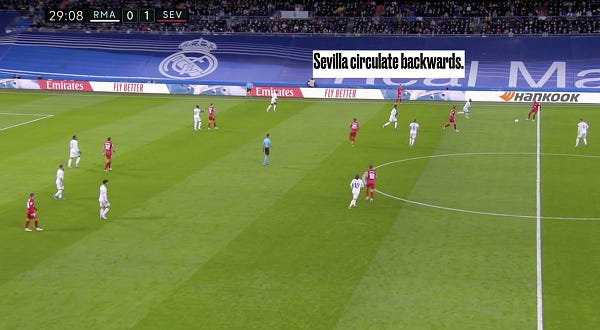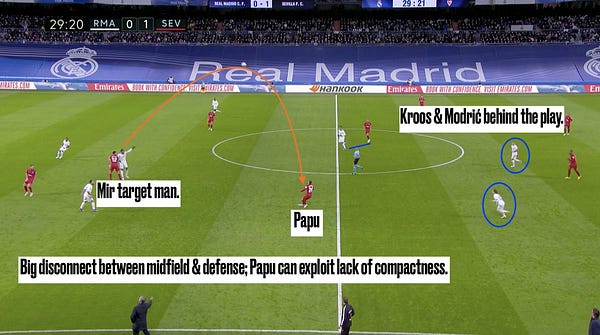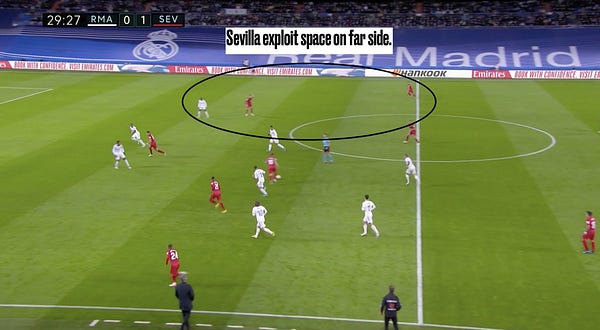Real Madrid's Champions League DNA is Both Real & Fake
Psychological edges exist, but it's time to stop talking about them like they're magic.
Normally, all of my Champions League content is paywalled. However, since the topic at hand is more general and different in style to my prior, more technical breakdowns, I have decided to keep this one free.
Paid subscribers: I have some interesting things planned for you, so don’t worry.
If you’d like access to what comes in the future in addition to my entire archive, you can take advantage of a few discounts:
There are few things that rankle an analytical fan more than the cliché of “mentality.” While household names in sports journalism berate the amateur for having the audacity to analyze possession structure (“what gives you the knowledge and expertise?”), our TV pundits happily blather about the inner workings of Paul Pogba’s mind like they’re married to him and have rented out a living space inside Manchester United’s dressing room.
The irony, of course, is that, by following the logic of credentialism, only a sports psychologist with direct access to the team should be able to speak about whether someone “wanted it more” or had the requisite pashun and grit, since there is only so much we can perceive as outsiders.
Needless to say, most gatekeeping over what people can and cannot talk about is idiotic. The entire point of following sports is to discuss, dissect, and obsess over it in ways that border on the unhealthy and absurd (football is entertainment and it isn’t actually that important, anyway). But, if we really want to go there, tactical analysis is quite simply the easiest thing a fan can engage in with no professional experience or qualifications. At its most basic level, all you need to do is watch the game and describe what is happening.
For the nerds who want to aspire to a higher standard, the resources to do it well are freely and readily available, including tactical websites manned by actual coaches to explainers from the horse’s mouth. When it comes to detailed, accessible information, tactical knowledge might be the most widespread currency for discourse in modern football. In fact, it’s gotten to the point where there’s little excuse for the paid opinion-havers (of which there are few and even fewer based on merit) to be ignorant about these things. People are tired of old, lazy tropes being used as a crutch for the inability to produce real insight.
I suspect this is why self-styled analysts can be so dismissive of the idea that player psychology and “intangibles” are subjects even worth investigating: “‘Mentality’ is for the simple people — those who lack the capacity to navigate the randomness of the sport in conjunction with meticulously-collected visual (and statistical) evidence.” Naturally, this snobbishness extends to assessments of teams that claim to embody this indescribable juju.
Real Madrid are the perfect example — and in this season more than most. Via xG difference, the runaway champions are barely the best side in La Liga and are a clear tier below heavyweights like Manchester City, Liverpool, and Bayern Munich.

By xG against, Madrid have only the seventh-best defense in the league; by goals against, Madrid are second-best, revealing a whopping 10-goal disconnect between on-field outcomes and the underlying numbers. In attack, there have been similar levels of overperformance, with Vinícius Júnior dramatically turning around a narrative of inefficiency while Karim Benzema has had his most clinical season ever.
Based on the “eye-test,” Madrid have been a structural mess; their press was so bad that Carlo Ancelotti had to stop trying to implement it at one point.











Within this context, it is understandable that the footballing world crumbled to their knees, collective jaw agape, as Madrid overturned a deficit vs. PSG, then did so again (albeit, in a more convoluted way) against Chelsea, and then again vs. City. It didn’t seem to make sense given the analysis.
FYI: there is a reason we care about shot metrics and tactics — they tend to be very good processes through which we can infer causal relationships and allocate luck. They help us parse through what teams should and shouldn’t be trying to do if they want to achieve success.
But these methods do not encompass all of the variables that affect the way a match can play out. Instead, they simply cover what is easiest for us to observe and systematize. As touched on before, there is a certain humility to sticking to this scientifically-inspired approach, admitting that we should be cautious about attributing events to things we cannot adequately grasp nor see. However, there is also a certain arrogance that comes with dismissing what we find difficult to measure. Just because we struggle to quantify it, doesn’t mean it fails to exist.
Rather than seeing that as a big loss in the Battle of Ideas™, acknowledging this would be a powerful first step in moving beyond mysticism and cliché. By accepting the value of psychological effects, we can start to consider its actual magnitude of impact in lieu of letting narrative overwhelm the complexity of the picture.
In Madrid’s case, it allows us to process their campaign and recent history in a way that is actually debatable and rooted in some type of tangible observation. For example, one could point out that Los Blancos place a huge institutional emphasis on the Champions League. They could then posit that this sets the tone for a culture that is obsessed with peaking on the continental stage, producing a kind of self-fulfilling prophecy; if you set lofty expectations and believe that you have an obligation to reach them, then the motivation to exert yourself in ways you wouldn’t elsewhere is that much greater, and you continue fighting till the end when all hope seems lost.
One could also also note the importance of Madrid’s incredibly experienced core. Karim Benzema, Luka Modrić, Toni Kroos, and Casemiro are all thirty or older and have had to manage the emotions and pressure that precede and follow massive Champions League ties at countless junctures, not to mention all that goes through one’s head in the match itself. They know not to get rattled when they go down big or start a game poorly. 92:48, the comeback vs. Wolfsburg, and the endless escapes in 2018 have taught them that football contests are long and dominance is ephemeral. There will always be a chance to score — there is always the second leg (except in finals).
Thus, when Benzema said “we are going to do something magical, which is win" prior to hosting City, it was less an expression of hubris and more a reflection of calmness, faith, and a historical appreciation for what him and other squad leaders had already achieved.
How, then, do we extricate the causality of this “Champions League DNA?” By looking at all the times Madrid lost. If this was such an overwhelming constant, then the All Whites would’ve won the competition every time; they wouldn’t have been stuck in a humiliating cycle of R16 defeats in the mid-2000’s; they wouldn’t have experienced thirty-two years of pain between their sixth and seventh European titles; and their victory over City wouldn’t have been the first time they overturned a first-leg deficit in the semi-finals.
Player quality is the fundamental determining factor behind Madrid’s accomplishments. After 2018, their paranormal connection to the Champions League wasn’t suddenly severed by an invisible force — they just got worse. Cristiano Ronaldo left, Luka Modrić and others burned out, and Madrid were unable to find capable reinforcements in the transfer market. Fast-forward to 2021/22 and Vinícius has been the best winger in the Champions League while Modrić continues his renaissance.


Furthermore, in 2011/12, this supposed inherent mentality didn’t even exist, as evidenced by Madrid bowing out to Bayern Munich on penalties. Ronaldo, Kaká, and the Clutch God Sergio Ramos all choked and blew it when they were part of the best team in the world. The irony is that the sense of expectation that buoys Madrid now was a huge weight on the team’s shoulders prior to 2014. Their comfort in distinctly uncomfortable situations had to be earned by adding more talent (see: Gareth Bale) and maintaining a baseline level of performance that enabled them to keep mounting title challenges.
Hence, we can view Real’s psychological edge as something that was constructed over time (and within specific timeframes) rather than being an ever-present forcefield, and as one of many interrelated factors contributing to their success (Los Merengues were actually quite good vs. City in the away leg) or lack thereof. In this sense, Real Madrid’s Champions League DNA isn’t real. God did not bestow upon a random Spanish footballing institution the divine right to win a trophy.
But it is perhaps that very myth, which the thirteen-time champions believe in so deeply, that empowers them to occasionally — i.e. when a special generation of footballers unite — mutate into a genetic freak that possesses the verve, mental fortitude, and fighting spirit to overcome trials and tribulations that other superpowers of the game cannot.
Additional Reading:



